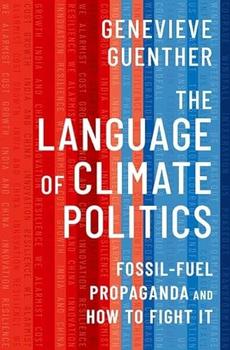
Fossil-Fuel Propaganda and How to Fight It
by Genevieve Guenther
In an illuminating analysis, Dr. Genevieve Guenther shows that the climate debate is not, in fact, neatly polarized, with Republicans obstructing climate action and Democrats advancing climate solutions. Partisans on the right and the left often repeat the same fossil-fuel talking points, and this repetition produces a centrist consensus upholding the status quo, even as global heating accelerates.
Weaving this analysis through fascinating critical histories of the terms that dominate the language of climate politics―the words we, alarmist, cost, growth, "India and China," innovation, and resilience―Dr. Guenther shows how this consensus is established. Fossil-fuel interests weaponize the discourses of science, economics, and activism, co-opting and twisting climate language to help greenwash their plans for ongoing extraction. But all too often climate scientists, economists, and even advocates will unwittingly echo the false and dangerous assumptions of their supposed political opponents. This apparent agreement between foes, filtered through the news media, not only influences our common-sense yet mistaken views about the climate crisis but also enables powerful decisionmakers to justify the corporate and policy actions that threaten us all. Revealing this dynamic, Guenther shows how to transform it.
Ultimately, The Language of Climate Politics is an inspiring call to arms, a book that equips readers with powerful new terms that will enable them to fight more effectively for a livable future.
"A revelatory study...It's a breath of fresh air." —Publishers Weekly (starred review)
"It's hard to imagine a savvier or more useful new account of our greatest crisis. People who care about the future will cherish this smart volume, which will turn them into far more effective advocates; it is a genuine gift to the world." —Bill McKibben, author of The End of Nature
"This is a brave, compelling, and necessary book. Guenther blasts away the most persistent myths of the climate crisis: that rapidly phasing out fossil fuels will devastate our economy; that China and India are the evil twins of climate politics; that building greater 'resilience' to climate impacts is a simple, catch-all solution. Guenther knows her subject and is a fabulous bullshit detector. Reading The Language of Climate Politics is an excellent way to arm yourself for the fight for a better future." —Jeff Goodell, author of the New York Times bestseller The Heat Will Kill You First
"This remarkable, empowering book is not just about, but a model instance of, climate communication. It makes a lucid, passionate case for moral anger directed at executives, politicians, economists, and journalists who obfuscate, exacerbate, or profit from the harms inflicted by the use of fossil fuels. If you want to understand the climate crisis and you only have time to read one book, this should be it." —Kieran Setiya, Professor of Philosophy, MIT, and author of Life is Hard
This information about The Language of Climate Politics was first featured
in "The BookBrowse Review" - BookBrowse's membership magazine, and in our weekly "Publishing This Week" newsletter. Publication information is for the USA, and (unless stated otherwise) represents the first print edition. The reviews are necessarily limited to those that were available to us ahead of publication. If you are the publisher or author and feel that they do not properly reflect the range of media opinion now available, send us a message with the mainstream reviews that you would like to see added.
Any "Author Information" displayed below reflects the author's biography at the time this particular book was published.
Genevieve Guenther is the founding director of End Climate Silence and affiliate faculty at The New School, where she sits on the board of the Tishman Environment and Design Center. Dr. Guenther advises NGOs, corporations, and policymakers on fossil-fuel disinformation and climate communication, and she serves as Expert Reviewer for the United Nations Intergovernmental Panel on Climate Change. Her research has appeared in both scholarly journals and media outlets such as Scientific American, The New Republic, and MSNBC, and she has been invited to speak about climate and language to audiences at Duke, Columbia, and Harvard, among other universities. She lives in New York City with her family.
Your guide toexceptional books
BookBrowse seeks out and recommends the best in contemporary fiction and nonfiction—books that not only engage and entertain but also deepen our understanding of ourselves and the world around us.